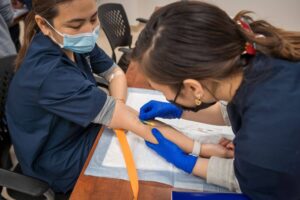Class Calendar | Call admissions on 415-943-2028
Get free phlebotomy training—exclusively for eligible Amazon Associatess / Find MA training at BAMA
Class Calendar | Call admissions on 415-943-2028

The Bureau of Labor Statistics (BLS) reports that phlebotomy employment is projected to grow 8 percent this decade, which is faster than the average for all occupations. With the healthcare industry, and the need for employing phlebotomists, expanding at such a rate—now is a great time to start looking at accredited phlebotomy classes in the San Francisco Bay Area if becoming a phlebotomist is a career you’d like for yourself. Choosing an accredited phlebotomy class is the first step in ensuring you’ll receive approved and quality phlebotomy instruction. So, here’s what you can expect to learn during your phlebotomy training—and why attending an accredited phlebotomy class is important.
In California, accredited phlebotomy classes approved by an institution such as the California Department of Public Health means the classes have met healthcare training industry standards. Students can be confident that their training will prepare them for certification exams and employment after graduation. Remember, accreditation is more than just a label awarded to a school—it represents a school’s guarantee to a student of quality teaching leading to career readiness. Most importantly, accredited classes ensure your training aligns with the standards required to become a licensed Certified Phlebotomy Technician (CPT-1), which is the license phlebotomists need to draw blood in the state of California aside from their national phlebotomy certification.
Programs will also usually cover anatomy, medical terminology, and lab safety so you understand both the how and why of blood collection procedures.
Learn the Soft Skills That Make a Difference
Along with technical ability, phlebotomists also need to connect with patients. During phlebotomy training, students will learn how to:
These people-focused skills will help you create positive experiences with each patient you meet.
Accredited phlebotomy classes should include an externship at hospital, clinic, or doctor’s office where you’ll get the chance to work in real medical environments. The externship is your chance to work with actual patients, but you’re still in a controlled and supervised environment. You gain real-world experience so that you’re prepared for your future role. This is your opportunity to:
• Apply your classroom knowledge in a hands-on setting
• Work alongside licensed healthcare professionals
• Gain the confidence and experience employers are looking for
Additionally, the externship will provide you with a possible direct path to healthcare employment, as some externship partners use their programs to find full-time phlebotomists. A school that offers externships with local healthcare employers will give you a competitive advantage when you’re ready to start your career. Employers trust accredited programs because they know graduates are well-trained and certified.
BAMA Institute holds the phlebotomy school accreditations that California’s top healthcare employers trust. To learn more about accredited phlebotomy classes at both our San Francisco and San Jose campuses, contact admissions today.
"*" indicates required fields
© 2024 BAMA Institute. All Rights Reserved. Website by WindsAndWater